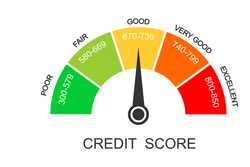When’s a Good Time to Request a Credit Limit Increase?

Our evaluations and opinions are not influenced by our advertising relationships, but we may earn a commission from our partners’ links. This content is created by TIME Stamped, under TIME’s direction and produced in accordance with TIME’s editorial guidelines and overseen by TIME’s editorial staff. Learn more about it.
When you open a credit card, you’ve got no say in how much credit you’re given. The bank looks at your credit health and forks over as much credit as it can comfortably give to someone with your credit history.
But what if it’s been a while since you opened your card, and you’re in much better shape than you were upon account opening? You’re a different person now, and you think you deserve to be trusted with more. Fortunately, (most) banks make requesting a higher credit limit a cinch.
Let’s take a look at how to request a credit limit increase—and whether someone in your situation should.
There are two reasons you might want to request a credit limit increase if you’re a big spender.
The first reason is to help with your credit utilization. Credit utilization is the percentage of available credit that you’re using—and it accounts for 30% of your credit score. As an example, if you’ve got $10,000 in credit, and you’ve currently got a $5,000 balance, your credit utilization is 50%. The rule of thumb is to keep your credit utilization below 30%. A higher percentage could potentially lower your credit score.
Second, it’s simply more convenient to have a higher limit so you don’t have to pay down your balance multiple times each month to free up your credit line.
If you opened your card when your credit score was less than perfect, it’s likely that you received a credit limit according to that score. If your credit score has improved, the bank may entrust you with more credit.
This often means you’ve been a model credit card holder with no late payments, defaults, etc.
You can check your credit score for free with sites such as Experian (which offers your free Experian credit score) and myFICO (which offers your free Equifax credit score), both of which offer free monthly credit scores after you enroll. Both sites also provide paid services if you’d like a more detailed look at your credit—including credit monitoring, identity monitoring, and three-bureau credit score monitoring.
If you’ve changed jobs or received a raise, you should update your financial details within your credit card account. The bank may take your new income into account and decide that you can handle more credit.
Again: To receive a credit limit increase, you’ll have to show the card issuer that you’re a responsible and upstanding customer. If you’re not paying your bills on time, and you’re maxing out your credit card, a lender isn’t likely to trust that you’ll use additional credit responsibly.
When you apply for—and are approved for—a credit card, the card issuer weighs your credit profile and assigns you a credit limit accordingly. If you’ve just opened a credit card, you shouldn’t immediately ask for an increased credit line. The amount you received was the amount the bank was willing to give.
Before offering you more credit, a lender will want to see a streak of good habits. Wait until you’ve got a year or two of healthy credit history with the bank and then apply.
Here’s one enormous reason not to go for a higher credit limit: You’ve maxed out your credit card, and you’re carrying a balance month-to-month.
This is the reason credit limits exist—so you don’t continue to spend and spend beyond your means. The fact that your credit line is tied up, and you don’t have any more to spend is saving you from digging yourself into a deeper hole.
If you want more credit, you’re forced to pay off at least a portion of your balance first. Besides, you’re unlikely to be approved for a credit limit increase if you’re carrying a large balance.
If you’ve just requested an increase to your credit limit, don’t make another request. You may be unsatisfied with what you were given, but there’s no reason for the bank to reevaluate your credit twice in a short period of time. It’s highly unlikely that there’s anything new in your credit report that would cause them to change their minds.
Not all credit card issuers give you the option to request a credit line increase. You may have to wait for them to approach you via email, snail mail, or secure message via your account.
For those that do offer this perk, you can simply call the number on the back of your card to inquire. Some bank websites will let you submit your request online.
Depending on how thorough your bank is when deciding whether to approve a credit limit increase, you may need to answer a list of questions. It may ask for updated income information, household income, your employment situation, etc. as it works to justify allowing you to borrow more money.
It’s also not uncommon for the bank to perform a hard credit inquiry on your credit score to examine your credit habits with additional lenders. This will temporarily drop your credit score, but it’ll bounce back in a month or two as long as you continue to exhibit good credit patterns.
The bank will also likely take a look at how solid a cardholder you’ve been with its products.
Lots of this can be automated and result in an approval (or denial) on the spot. Alternatively, the process could take several days. You may even see an increase to your credit limit within your online account before you even hear back from the bank with an official answer.
Instead of relying on credit line increases to open up more available credit to you, there are a couple things you should consider.
If you’ve got a good credit score, why not simply open another credit card? There are tons of excellent credit cards for every type of credit profile—many of which have valuable welcome bonuses.
Opening another credit card will help you to keep your overall credit utilization lower, and it’ll even contribute to a more robust credit history if you keep it open for a long time. Plus, making timely payments with another credit card account can help your credit score to thrive.
If you’ve got more than one credit card with a single credit card issuer, it may be possible to shift your credit from one card to the other. This can effectively provide a substantial credit limit increase with one card while reducing your credit limit on the other.
For example, let’s say you have two credit cards:
You can ask the bank to move $3,000 worth of credit from your Chase Freedom Flex to the Chase Sapphire Preferred, and you’ll be left with an $13,000 credit line and a $2,000 credit line.
If you have a good relationship with your bank due to on-time payments and routinely low credit card balances, you’re justified in asking for a credit line increase. Your credit score is almost certainly higher than it was when you first applied, and you’ve shown no signs of financial trouble that may label you a risky borrower.
Also, if you experience positive life changes—such as notably higher pay, lower housing payments, or an increased household income due to marriage—the bank may extend more credit to you.
It’s not good to keep asking your credit card issuer for a credit limit increase. Wait until you feel that there’s been a development in your life that warrants a credit limit increase. Think higher pay, improved credit score, etc.
It’s wise to wait at least three months after you open a credit card before you request a credit limit increase. Also, you should put at least six months between credit limit increase requests.
A normal credit limit increase tends to be between 10% and 25% of your credit card’s current credit. It’s certainly possible to exceed this amount, but reports indicate that the issuer is more likely to perform a hard pull on your credit score in that event.
It does not hurt your credit to ask for a credit increase. In many cases, the bank may grant you more credit if you’ve shown yourself to be a good customer. However, if the bank decides to trigger a hard credit pull on your score to make their decision, your credit score will briefly drop by a few points. With responsible credit card activity, it’ll bounce back in a couple months.
Getting a credit limit increase can make your credit card far more valuable, particularly if you were approved for a card with a very low balance. It will help to keep your credit utilization low, which greatly benefits your credit score.
The information presented here is created by TIME Stamped and overseen by TIME editorial staff. To learn more, see our About Us page.



